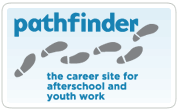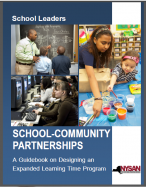Start a Program
The following resources may be helpful to you as you are starting a new afterschool program.
State Licensing/Registration
- To see if your program is required to register as School-Age Child Care (SACC) with the Office of Children and Family Services (OCFS). Information on the SACC regulations and registration process can be found on the OCFS website. To find out if you need to be registered or more about the regulations, click here, and also check the OCFS website.
- Please note that all questions regarding SACC regulations and registration should be addressed to your OCFS Regional Office.
- For more information about ongoing efforts to update the SACC regulations, please see the Network for Youth Success’ Policy Priorities.
General
- The National Clearinghouse on Families and Youth’s Guide to Starting a Youth Program gathers together a wealth of online information about how to start and manage a program.
- SEDL’s toolkit, Resource Guide for Planning and Operating Afterschool Programs, provides a description of resources to support afterschool programs. Many of the entries will also apply to before-school, summer, and community learning center programs.
- The Afterschool Alliance website provides resources for finding resources in your community.
- The Afterschool Investments resource guide presents helpful publications and resources as well as a range of considerations as you begin to develop an afterschool program.
Funding and Sustainability
- The Wallace Foundation and FMA provide a compilation of valuable tools for financial planning.
- Afterschool Alliance offers a set of assorted funding tips and tools.
- ExpandED’s (formerly TASC) Youth Funders Database is a very comprehensive search tool for funding.
- The Wallace Foundation’s cost calculator for afterschool programs can be very useful to determine “reasonable” costs.
- Many afterschool programs are eligible to receive reimbursements for suppers and snacks. Find out more by reading What Programs Need to Know About the At-Risk Afterschool Snack and Supper Program.
Learn more on Network for Youth Success’ Funding and Sustainability page.
Program Design and Quality
The research is clear that quality matters. Please plan for quality from the beginning so that students gain maximum benefits from your program.
- The Network for Youth Success’ Quality Self-Assessment (QSA) Tool will help guide your program planning. Be sure to check out the critical indicators to program start-up and checklist for new programs, as well as the sections on sustainability and evaluation when designing your program.
- Moving Towards Success: Framework for After-School Programs by the Mott Foundation is a framework for afterschool which employs a theory of change approach to guiding thinking about your program structure and progress, highlighting desirable outcomes and conditions for program success.
- Engaging Families in Afterschool and Summer Learning Programs: A Review of the Research describes what we know about making families partners in the success of their children in out-of-school programs—a crucial part or program success.
- Supporting English Language Learners in School and in Afterschool and Summers discusses the existing research and highlights practices for making afterschool and summer learning programs accessible to English Language Learners.
- The Adolescent Development Toolkit by ACT for Youth is a compilation of resources that describe adolescent development, including a section specifically for youth programs.
Expanded Learning Models
These resources may be particularly helpful for schools and community organizations looking to work closely together to provide school-based afterschool programs or to implement expanded learning time.
- School-Community Partnerships: A Guidebook on Designing an Expanded Learning Time Program was developed by Network for Youth Success to provide an outline of some of the questions and possibilities that principals and other school leaders may want to consider as they plan for implementation of expanded learning time in collaboration with a community partner. This guidebook is applicable to any program seeking to form strong school-community partnerships, especially through the use of expanded learning time.
- A Toolkit for Expanded Learning developed by the Every Hour Counts compiles the best of resources from EHC and partner organizations on building systems and developing high quality models grounded in school and community partnerships.
- Community Schools are another form of expanded learning that incorporate wrap-around services and generally include afterschool programs. The Network for Youth Success’ Community Schools Resources may be helpful to schools and programs planning and implementing Community Schools.
Middle School Programs
These resources may be helpful for programs specifically targeting middle school youth.
- Supporting Success in the Middle Grades, a toolkit created by Foundations Inc. and presented at the 2014 PASE@PACE Conference, may guide program practices and policies by responding to the specific needs and behaviors of middle school students.
- Strengthening NYC Middle-Grades Learning In & Out of School: Five Recommendations to the Mayor (June 2014) In response to Mayor Bill de Blasio’s announcement of his commitment to after school programs for middle school students, Bank Street College of Education, the Partnership for After School Education (PASE), and the Ford Foundation collaborated on this report in hopes of guiding the initiative. Their five recommendations may help to guide your program this fall.
- The Youth Development Institute (YDI) has several helpful resources. Engaging Middle-School Youth Through Project-Based Learning Clubs shares best-practices.The Recruitment Cycle and Stages of Middle School Youth Motivation presented at the 2014 PASE@PACE Conference share the cycle of advertising your program, keeping youth engaged in your program, and motivating middle school youth to attend the program at various stages.
Managing the Media for New Programs
- Engaging the media as a new program can come with it’s own set of concerns. The Network for Youth Success’ tips for media visits to new programs may be helpful if reporters are visiting your program.


